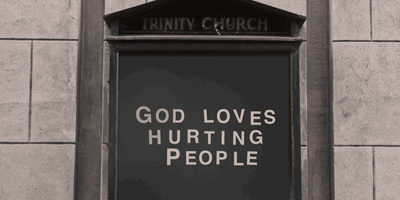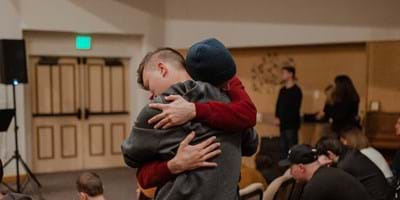Some years ago I had a great conversation with a couple of Muslim men in Egypt. One of them, having read through the Old Testament, had many challenges. “One thing,” he said, “that proves Christianity is false is that nobody ever knew anything about the Trinity until the New Testament.” He argued that the Trinitarian God of Christianity stood in stark contrast to the God of the Old Testament.
Before I continue with that conversation, it is worth briefly stating what is meant by the ‘Trinity’. What does it mean to say that God is Triune or three-in-one?
What is not meant is that God is three in the same way as He is one. That would demand a logical contradiction. However, God is three in a different way than He is one: God is three Persons in one Being.
This lies beyond our limited comprehension as it is not a concept we can visualise. We are familiar with beings who are not persons (animals, birds, fish) and beings who are each one person (humans). However, God is a Being who is three Persons. These three Persons are the Father, the Son, and the Holy Spirit. We struggle to adequately illustrate the truth of the Trinity by any earthly comparison.
In my conversation with my two Muslim friends (Abdo and Ahab) I commenced my response by turning them back to the first verse of the first chapter of the Bible:
“In the beginning God created the heavens and the earth” (Genesis 1:1).
“This verse,” I said, “doesn’t teach that God is Triune, but it certainly allows for that later teaching”.
Abdo was a very earnest man; he peered intently at the verse, “How?”
“The Hebrew word translated ‘God’ is Elohim which is a plural noun” I said, “Not only so, but the verb ‘created’ is singular.”
I told him that Hebrew scholars recognise that the use of the plural noun with the singular verb is unusual. The singular verb clearly guards against the idea that there was a plurality of ‘gods’ who created the universe. However, the plural word for God also allows for the later revelation that within this one God there is a plurality of persons.
After explaining this, I asked my friends to read further on down Genesis chapter 1:
“Then God said, ‘Let Us make man in Our image, according to Our likeness; let them have dominion over the fish of the sea, over the birds of the air, and over the cattle, over all the earth and over every creeping thing that creeps on the earth.’ So God created man in His own image; in the image of God He created him; male and female He created them” (Genesis 1:26-27).
They could see what I had in mind: God is in conversation, but to whom could He be speaking? They suggested that God was speaking to angels. I explained that this could not be the case. God says “Let Us make man in Our image” and, if God was speaking to angels, then man must be made in the image of angels. However, the next verse clearly stresses that it was in God’s image that man was created: “So God created man in His own image; in the image of God He created him”.
Not only so but the Bible teaches that God created alone. As Isaiah puts it "I am the LORD, who makes all things, Who stretches out the heavens all alone, Who spreads abroad the earth by Myself” (Isaiah 44:24). No angels took place in the creation work, only God.
The simple explanation (and that which agrees with the rest of the Bible) is that this is a conversation between the Persons of the Trinity. There is plurality, “Let Us make man in Our image,” and there is unity, “So God created man in His own image”.
Perhaps as you have read this you are thinking, “So what?” Even Christians who affirm the truth of the Trinity may wonder what the implications of this doctrine are. Let’s draw out an important consequence of this truth.
God is Love
Twice over in his first epistle John states that “God is love” (4:8,16). However, if there were no plurality of Persons in God love could not be an intrinsic attribute of deity. Love cannot exist without an object and the eternal ‘objects’ of the love of each divine Person were the other divine Persons.
True love is volitional and self-sacrificial. It means prioritising the interests of others and seeking the benefit of others, even at cost to oneself. This has been active within the Trinity eternally. Confirmations of this love relationship are found throughout John’s Gospel. The Spirit glorifies the Son (16:14); the Son glorifies the Father (17:4); and the Father glorifies the Son (17:5). Each person promotes the interests of the others. This is divine love: the opposite of self-centredness.
The eternal joy of the Triune God has been that of perfect, mutual, self-giving, other-centred love. As C. S. Lewis put it, “The persons within God exalt, commune with, and defer to one another … each divine person harbours the others at the centre of his being.” This love-relationship is the foundation of all reality.
Love is Good
God’s purpose for human beings is that they enter into the enjoyment of this other-centred love relationship; there is no comparable joy to be found. Christians will testify that the deepest joy they experience is when, by God’s grace, their love for God and others overflows and they are actively engaged in sacrificial service.
Sin is the antithesis of this. Sin is self-centred. It is choosing one’s own way, rather than God’s way. It is serving self rather than others. This bars us from fellowship with God. However, God’s own nature of self-sacrificial love has been fully demonstrated toward those who have sinned against Him:
“God demonstrates His own love toward us, in that while we were still sinners, Christ died for us” (Romans 5:8).
The love of the Triune God for you is so great that He has sacrificed immeasurably for your joy. “God so loved the world that He gave His only begotten Son” (John 3:16) and the Son of God “has loved us and given Himself for us” (Ephesians 5:2).
Here is love, vast as the ocean,
Loving-kindness as the flood,
When the Prince of Life, our Ransom,
Shed for us His precious blood.
Why not acknowledge your self-centred sinfulness to God and trust the risen Son of God as your Saviour today? In the secure embrace of God’s love you will be freed to love Him and others and enter into true joy.



























